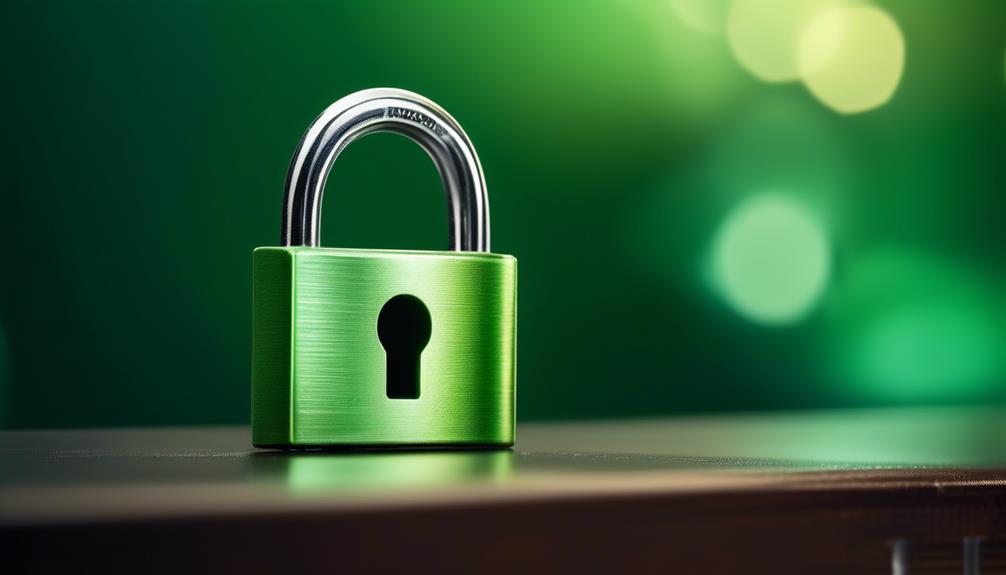The Critical Role of SSL Certificates in Modern Web Security
When you visit a website, imagine the data you exchange with it as a fragile package, traveling through a maze of interconnected networks. Without the proper protection, your package could easily fall into the wrong hands or be tampered with along the way.
This is where SSL certificates come in. They play a critical role in securing your online transactions and communications, ensuring that your sensitive information remains confidential and intact.
But what exactly are SSL certificates, and how do they work? Why are they so important in today's digital landscape? And what are the potential consequences of not using them?
In this discussion, we will explore the answers to these questions and shed light on the critical role SSL certificates play in modern web security.
Key Takeaways
- SSL certificates are crucial for web security, providing encryption and authentication of data.
- SSL certificates enhance data protection, secure communication, and prevent unauthorized access.
- SSL certificates establish trust and credibility with users, displaying trust indicators and positively impacting website performance.
- SSL certificates protect against SSL vulnerabilities, encrypting data transmission and preventing unauthorized interception.
What Are SSL Certificates?

SSL certificates are a crucial component of web security, ensuring the encryption and authentication of data transmitted between your web browser and a website's server. These certificates provide several benefits that contribute to a safer online experience for you and other users.
Firstly, SSL certificates enable secure communication by encrypting the data exchanged between your browser and the server. This encryption makes it extremely difficult for hackers to intercept and decipher the sensitive information you send and receive, such as login credentials or credit card details.
Secondly, SSL certificates authenticate the identity of the website, verifying that it's legitimate and not an imposter attempting to steal your information. This authentication process builds trust and confidence for users, as they can be certain that the website they're accessing is genuine and trustworthy. To install an SSL certificate, the website owner must go through a verification process to prove their identity and ownership of the domain. Once the certificate is obtained, it's installed on the server, and visitors to the website can then access the site securely.
How SSL Certificates Work
To understand the functioning of SSL certificates, it's essential to delve into the intricate process of secure communication between web browsers and servers. SSL certificates play a critical role in ensuring secure communication by encrypting data transmitted between the two parties.
Here is how SSL certificates work:
- Authentication: SSL certificates authenticate the identity of the server to the browser, ensuring that the website is legitimate and not an imposter.
- Encryption: SSL certificates use encryption algorithms to scramble the data transmitted between the browser and server, making it unreadable to anyone who intercepts it.
- Data Integrity: SSL certificates also ensure data integrity by using digital signatures. These signatures verify that the data hasn't been tampered with during transmission.
- Trust and Verification: SSL certificates are issued by trusted Certificate Authorities (CAs) after verifying the identity of the website owner. This builds trust between the website and the user.
- Protection against Phishing Attacks: SSL certificates protect against phishing attacks by displaying visual cues, such as a padlock icon or a green address bar, indicating that the connection is secure and the website is trustworthy.
The Importance of SSL Encryption

SSL encryption plays a vital role in web security by providing enhanced data protection. By encrypting the data exchanged between a user's browser and a website, SSL ensures that sensitive information remains secure and can't be intercepted by unauthorized parties.
Additionally, SSL encryption also helps establish trust and credibility, as users can verify the authenticity of a website through the presence of a valid SSL certificate.
Lastly, SSL encryption enables secure online transactions, safeguarding users' financial information and ensuring a safe online shopping experience.
Enhanced Data Protection
Implementing SSL encryption is crucial for enhancing data protection on the web. By encrypting the data transmitted between a user's browser and the website they're accessing, SSL certificates ensure the privacy and integrity of sensitive information.
Here are five reasons why SSL encryption is important for enhanced data protection:
- Secure Communication: SSL encryption ensures that data exchanged between a user and a website is encrypted, preventing unauthorized access and interception.
- Data Privacy: SSL certificates protect data privacy by encrypting sensitive information such as login credentials, credit card details, and personal information.
- Trust and Credibility: Implementing SSL encryption establishes trust with users, as they can see the padlock icon and the 'https' in the website's URL, indicating a secure connection.
- Protection Against Phishing Attacks: SSL certificates help in preventing phishing attacks by authenticating the identity of the website, protecting users from submitting their information to malicious sites.
- Compliance with Data Protection Regulations: Many data protection regulations, such as the GDPR, require the use of SSL encryption to ensure the security and privacy of personal data.
Trust and Credibility
By establishing a secure connection and displaying visual indicators of trust, SSL encryption enhances the website's credibility and instills confidence in users.
Trust is crucial in the online world, where users constantly share sensitive information. SSL certificates play a vital role in building this trust as they provide a secure and encrypted connection between the user's browser and the website. This not only protects the user's data from prying eyes but also assures them that their information is safe.
When users see the padlock icon or the 'https://' in the URL, they feel confident that their data is being transmitted securely.
Additionally, SSL encryption has a positive impact on website performance. While it may slightly increase the load time, the benefits of trust and improved user experience far outweigh this minor inconvenience.
Secure Online Transactions
To ensure the security of online transactions, websites rely on the implementation of SSL encryption. SSL certificates play a critical role in protecting sensitive information during secure online payments. Here are five key points to consider:
- SSL encryption provides a secure channel for data transmission, encrypting information such as credit card details, personal information, and login credentials.
- SSL certificates establish trust and credibility by verifying the authenticity of websites, ensuring that users are interacting with legitimate entities.
- SSL encryption protects against eavesdropping and data interception, ensuring that sensitive information remains confidential.
- SSL certificates help prevent man-in-the-middle attacks, where hackers intercept communications between users and websites to steal sensitive data.
- It's important to regularly update SSL certificates and keep up with security patches to address any vulnerabilities that may arise.
Types of SSL Certificates

Now let's explore the different types of SSL certificates that are available.
Certificate Authorities (CAs) play a crucial role in issuing SSL certificates and ensuring their authenticity.
Extended Validation (EV) certificates provide the highest level of security and trust by displaying the organization's name prominently in the address bar.
Additionally, there are wildcard and multi-domain certificates that allow for securing multiple domains or subdomains with a single certificate.
Understanding these different types can help you choose the right SSL certificate for your specific needs.
Certificate Authorities (CAs)
Certificate Authorities (CAs) play a crucial role in the issuance and validation of various types of SSL certificates. These trusted third-party organizations are responsible for verifying the authenticity of the certificate holder and encrypting sensitive data transmitted over the internet. Here are some important points to understand about CAs:
- Certificate revocation: CAs have the authority to revoke SSL certificates if they're compromised or no longer valid. This helps protect users from potential security breaches.
- Validation process: CAs follow a stringent validation process to verify the identity of the certificate applicant. This involves verifying domain ownership, organization details, and sometimes even conducting in-person checks.
- Hierarchy: CAs operate in a hierarchical structure, with root CAs at the top of the chain. Intermediate CAs are responsible for issuing certificates on behalf of the root CAs.
- Trustworthiness: CAs are trusted entities, and their reputation is crucial for maintaining the overall trust and security of the SSL ecosystem.
- SSL/TLS vulnerabilities: CAs play a vital role in addressing and mitigating SSL/TLS vulnerabilities, ensuring the security and integrity of encrypted communication.
Understanding the role of CAs is essential in comprehending the significance of SSL certificates in modern web security.
Extended Validation (EV)
As we shift our focus to Extended Validation (EV), a specific type of SSL certificate, we delve deeper into the realm of web security, exploring the rigorous validation process and additional features offered by EV certificates. EV certificates provide enhanced security and trust for online transactions by undergoing a thorough validation process. This process involves verifying the legal existence, physical location, and operational status of the entity requesting the certificate. Once the validation is complete, EV certificates display the organization's name in the address bar, along with a green padlock symbol, indicating that the website is secure and trustworthy. This added level of assurance helps protect users from phishing attacks and builds confidence in the website's authenticity. The table below summarizes the benefits and the validation process of EV certificates:
| Benefits | Validation Process |
|---|---|
| Provides enhanced security and trust | Thorough verification of entity's legal existence, physical location, and operational status |
| Displays organization name in the address bar | Ensures the information provided by the entity is accurate and up-to-date |
| Builds user confidence in website authenticity | Protects users from phishing attacks and fraudulent websites |
Wildcard and Multi-domain
Wildcard and Multi-domain certificates are two types of SSL certificates that offer flexibility and convenience for securing multiple subdomains or domains with a single certificate.
- Wildcard certificates allow you to secure an unlimited number of subdomains under a single domain. For example, a wildcard certificate for '*.example.com' can secure 'mail.example.com', 'shop.example.com', and 'blog.example.com'. The main advantage of wildcard certificates is their cost-effectiveness and ease of management. However, they can only be used for subdomains, not for securing multiple domains.
- Multi-domain certificates, on the other hand, allow you to secure multiple domains and subdomains with one certificate. This means that you can secure 'example.com', 'example.net', and 'example.org' with a single certificate. Multi-domain certificates are ideal for businesses with multiple websites or online properties. They offer flexibility and scalability, but they can be more expensive compared to wildcard certificates.
Benefits of Using SSL Certificates

Using SSL certificates provides several key benefits for enhancing web security. SSL certificates play a crucial role in securing your website by encrypting the data transmitted between the server and the user's browser. This encryption ensures that sensitive information, such as passwords and credit card details, remains secure and cannot be intercepted by malicious actors. Additionally, SSL certificates also have other advantages that contribute to a safer browsing experience for your users.
To help you understand the benefits of using SSL certificates more clearly, we have presented them in the table below:
| Benefit | Description |
|---|---|
| Data Encryption | SSL certificates encrypt the data transmitted between a web server and a user's browser, ensuring privacy. |
| Website Security | SSL certificates authenticate the identity of your website, preventing unauthorized access and phishing. |
| Trust and Credibility | SSL certificates display trust indicators, such as the padlock icon, reassuring users of your website's security. |
| SEO Boost | Google considers SSL certificates as a ranking signal, giving websites with SSL a slight SEO advantage. |
| Compliance | SSL certificates help meet industry standards and regulations, such as the Payment Card Industry Data Security Standard (PCI DSS) and General Data Protection Regulation (GDPR). |
SSL Certificates and Website Authentication
SSL certificates play a crucial role in website authentication.
By providing secure and encrypted connections, they ensure that the information transmitted between the user's browser and the website remains confidential and protected from unauthorized access.
In addition to enhancing security, SSL certificates also instill trust and credibility in website visitors.
Visitors can verify the authenticity of the website through the validation process.
Importance of SSL Authentication
To ensure the security and trustworthiness of your website, it's imperative to implement SSL authentication through the use of SSL certificates. SSL certificate management plays a crucial role in maintaining the integrity of your website's security.
Here are five reasons why SSL authentication is important:
- Protection against data breaches: SSL certificates encrypt the data transmitted between your website and its visitors, preventing hackers from intercepting and accessing sensitive information.
- Establishing trust: SSL authentication verifies the identity of your website, assuring visitors that they're connecting to the legitimate and secure site.
- Prevention of phishing attacks: SSL certificates help protect against phishing attacks by displaying visual cues, such as the padlock symbol and the 'https://' prefix, indicating a secure connection.
- Improved search engine rankings: SSL authentication is now a ranking factor for search engines, meaning websites with SSL certificates are more likely to appear higher in search results.
- Enhanced customer confidence: SSL authentication instills confidence in your visitors, ensuring they feel safe to share personal information or make online transactions on your website.
Implementing SSL authentication with SSL certificates is essential for safeguarding your website and building trust with your audience.
Benefits of SSL Certificates
Implementing SSL authentication with SSL certificates not only ensures the security and trustworthiness of your website, but it also brings a multitude of benefits to enhance the overall web experience.
One of the key benefits is client authentication, which verifies the identity of the user accessing your website. This prevents unauthorized access and protects sensitive information from falling into the wrong hands.
Additionally, SSL certificates enable the implementation of HTTPS, which encrypts the data transmitted between the user's browser and the web server. This ensures that the information exchanged remains confidential and can't be intercepted by malicious actors.
SSL Certificates and Data Integrity

When ensuring the integrity of your data, it's essential to consider the role of SSL certificates. SSL certificates play a crucial role in maintaining data privacy and protecting against SSL vulnerabilities.
Here are five key points to understand about SSL certificates and data integrity:
- Encryption: SSL certificates encrypt the data transmitted between a server and a client, ensuring that it remains secure and can't be intercepted by unauthorized parties.
- Verification: SSL certificates verify the identity of the website or server, ensuring that you're communicating with the intended recipient and not an imposter.
- Integrity: SSL certificates use cryptographic algorithms to ensure the integrity of the data. This means that any tampering or modification of the data during transmission will be detected.
- Data Privacy: SSL certificates protect the privacy of your sensitive information, such as personal details, credit card numbers, and login credentials. This prevents unauthorized access and keeps your data safe from prying eyes.
- SSL Vulnerabilities: SSL certificates also help protect against SSL vulnerabilities, such as man-in-the-middle attacks and phishing attempts. By encrypting the data and verifying the server's identity, SSL certificates add an extra layer of security to prevent these types of attacks.
SSL Certificates and Online Trust
SSL certificates are essential in establishing online trust and ensuring secure communication between a server and a client. In today's digital landscape, where online security is of paramount importance, users are increasingly concerned about the safety of their personal information. SSL implementation plays a critical role in addressing these concerns and building trust with users.
When a website or online service has an SSL certificate, it signifies that the connection between the server and the client is encrypted and secure. This encryption ensures that sensitive information such as passwords, credit card details, and personal data remains private and can't be intercepted by malicious actors. By implementing SSL certificates, organizations demonstrate their commitment to safeguarding user information and protecting their online interactions.
SSL certificates also play a crucial role in establishing online trust. When users see the padlock icon or the 'https://' prefix in their browser's address bar, they know that the website they're visiting is secure and trustworthy. This visual indication provides users with the confidence to share their information and engage in online transactions without fear of their data being compromised.
SSL Certificates and SEO Implications

The presence of SSL certificates on a website can have significant implications for its search engine optimization (SEO) performance. When it comes to website rankings and user experience, SSL certificates play a crucial role.
Here are five SEO implications of having SSL certificates on your website:
- Improved website rankings: Search engines like Google consider SSL certificates as a ranking factor. Websites with SSL certificates are more likely to rank higher in search engine results pages (SERPs) compared to those without.
- Increased trust and credibility: SSL certificates provide a secure connection between the website and the user's browser, ensuring that sensitive information remains private. This boosts user trust and credibility, which can positively impact SEO.
- Enhanced user experience: SSL certificates encrypt data transmitted between the website and the user, preventing unauthorized access. This encryption adds an extra layer of security, giving users peace of mind and a smoother browsing experience.
- Reduced bounce rates: When users visit a website and see the 'Not Secure' warning, they're more likely to leave immediately. Having an SSL certificate eliminates this warning, reducing the bounce rate and improving SEO performance.
- Mobile-friendly ranking boost: Google has stated that having SSL certificates is a ranking signal for mobile searches. Websites with SSL certificates are more likely to receive a ranking boost in mobile search results.
Best Practices for SSL Certificate Implementation
Implementing SSL certificates requires careful consideration of best practices to ensure optimal web security. Proper SSL certificate management is essential to minimize vulnerabilities and protect sensitive data transmitted between the server and the client.
Firstly, it's crucial to select a trusted Certificate Authority (CA) to issue the SSL certificate. CAs play a critical role in verifying the identity and legitimacy of the certificate holder. Choosing a reputable CA helps prevent potential issues arising from compromised or fraudulent certificates.
Secondly, it's recommended to use a certificate with a longer validity period. While shorter validity periods enhance security by reducing the risk of using outdated encryption algorithms, longer validity periods reduce the frequency of certificate renewals and potential human errors during the process.
Additionally, implementing a robust certificate monitoring and renewal process is vital. Regularly monitoring SSL certificates ensures that any vulnerabilities or weaknesses are promptly identified and addressed. Automating the renewal process helps avoid certificate expiration and potential service disruptions.
Furthermore, organizations should implement proper SSL certificate installation practices. This includes securely storing private keys, using strong encryption algorithms, and enabling appropriate security protocols, such as HTTP Strict Transport Security (HSTS).
Frequently Asked Questions
Are SSL Certificates Only Necessary for Websites That Handle Sensitive Information or Transactions?
SSL certificates are not only necessary for websites that handle sensitive information or transactions. SSL certificate adoption in non-transactional websites has increased due to the benefits they provide in terms of data integrity, authentication, and SEO rankings.
Can I Use a Free SSL Certificate Instead of Purchasing One?
Yes, you can use a free SSL certificate instead of purchasing one. However, there are limitations such as limited validity and lower trust levels. The advantages include cost savings and basic encryption for your website.
How Often Do SSL Certificates Need to Be Renewed?
SSL certificates need to be renewed periodically based on their validity period, which is typically one to three years. The process involves obtaining a new certificate and installing it to ensure continuous secure web communication.
Can I Have Multiple SSL Certificates for Different Subdomains of My Website?
Yes, you can have multiple SSL certificates for different subdomains of your website. It is beneficial to use wildcard SSL certificates as they secure multiple subdomains with a single certificate. When choosing an SSL certificate, consider the level of validation and encryption required for your website.
Do SSL Certificates Have an Impact on Website Loading Speed?
SSL certificates can impact website loading speed due to the process of encryption and decryption. However, the impact is minimal and can be mitigated by ensuring compatibility with different web browsers and optimizing the certificate configuration. Additionally, SSL certificates positively affect search engine rankings.
Conclusion
In conclusion, SSL certificates play a critical role in modern web security. They provide encryption, ensuring data integrity and online trust.
Different types of SSL certificates offer varying levels of security and benefits.
Implementing SSL certificates isn't only essential for protecting sensitive information but also for enhancing SEO rankings.
Following best practices for SSL certificate implementation is key to ensuring a secure and trusted online environment.








